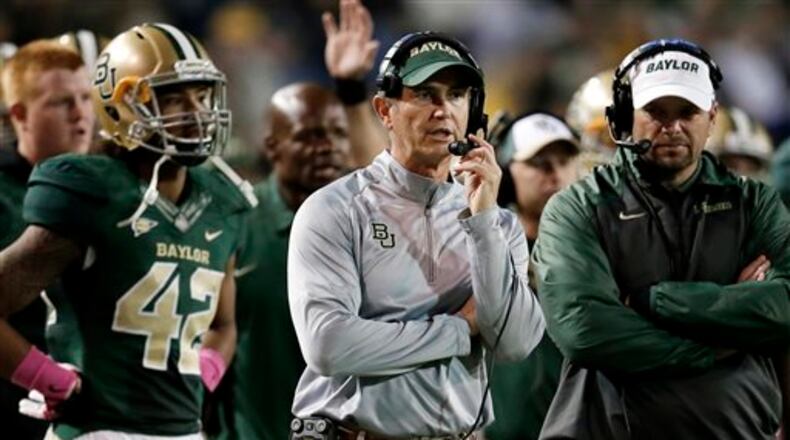What's next? There's the real question. Was Thursday a watershed moment? Or was it a mere speed bump for what this is really all about _ the money train that is college sports?
Five things we learned:
1. The desire to win can be a drug. After being a Big 12 punching bag for so long, Baylor no doubt fell so hard for the intoxicating feeling of fielding a championship-level football team, it paid scant attention to what was really happening with its football program. Just let me enjoy my hot dog. Don't tell me how it was made.
Let's not be naive here. Money figured heavily into the equation. Baylor made plenty of money off its football program and not just from ticket sales. It built a $260 million football stadium. The positive publicity generated by a winning football team no doubt helped donations and enrollment. It cost $42,546 a year in tuition and fees to attend Baylor. In the fall of 2015, Baylor reported record enrollment.
2. Sexual violence against women on campus is a growing problem. Given the attention this issue has attracted, finally, in the past year or so, it's much more disturbing that Baylor coaches either failed to report or did everything they could to persuade victims not to report incidents.
A study last year reported that 23 percent of women said they had been sexually assaulted while on campus. Baylor's population is 58 percent female. Yet the school did little to nothing to protect its female students from a football team that, according to the investigator's reports, considered itself "above the rules."
3. There continue to be questions about the relationships between athletic programs and local police departments. Such questions arose in the way Tallahassee, Fla., police handled allegations against Florida State quarterback Jameis Winston. There were questions in outside counsel Pepper Hamilton's report about Waco, Texas, police. And don't be surprised if there are now more questions about the relationship between Knoxville, Tenn., police and Butch Jones after the police chief admitted he made "courtesy calls" to the Tennessee football coach about UT players under investigation for sexual assault.
4. Giving second chances is risky business. By all accounts, Briles took great pride in giving troubled players a second chance. He spoke of it often and wrote about it extensively in his book. According to Hamilton's report, however, Briles failed to do his due diligence in gathering information about transfers' backgrounds. Maybe he felt like he had to cut corners and take chances to build Baylor up from the bottom, but in the end that approach was a pipe bomb ready to blow. And blow it did.
5. Coaches have too much power, especially successful coaches. There should be checks and balances in every institution. Too often, successful coaches are more powerful than school presidents _ "I just hope the coach doesn't dismiss me," former Ohio State president Gordon Gee once famously said of his then football coach, Jim Tressel. Absolute power corrupts absolutely.
About the Author
